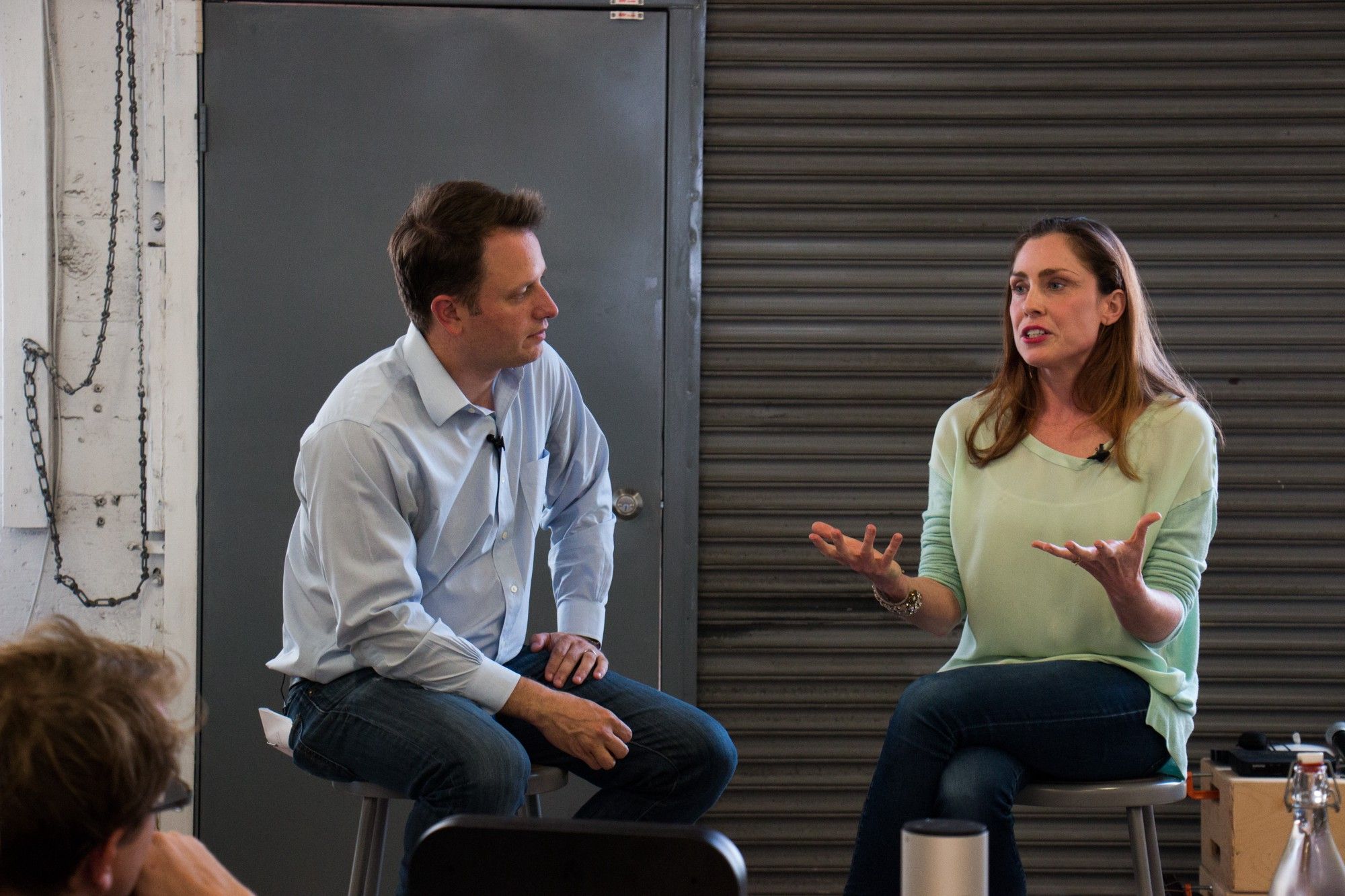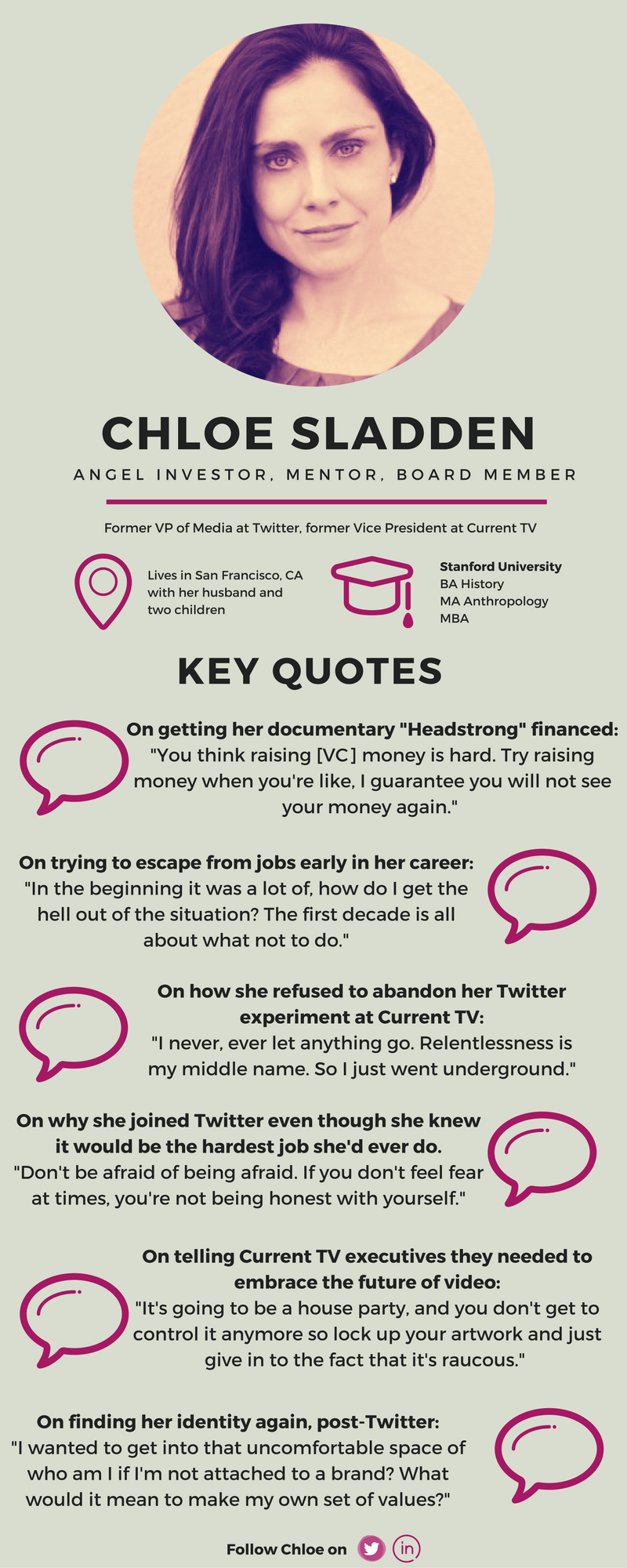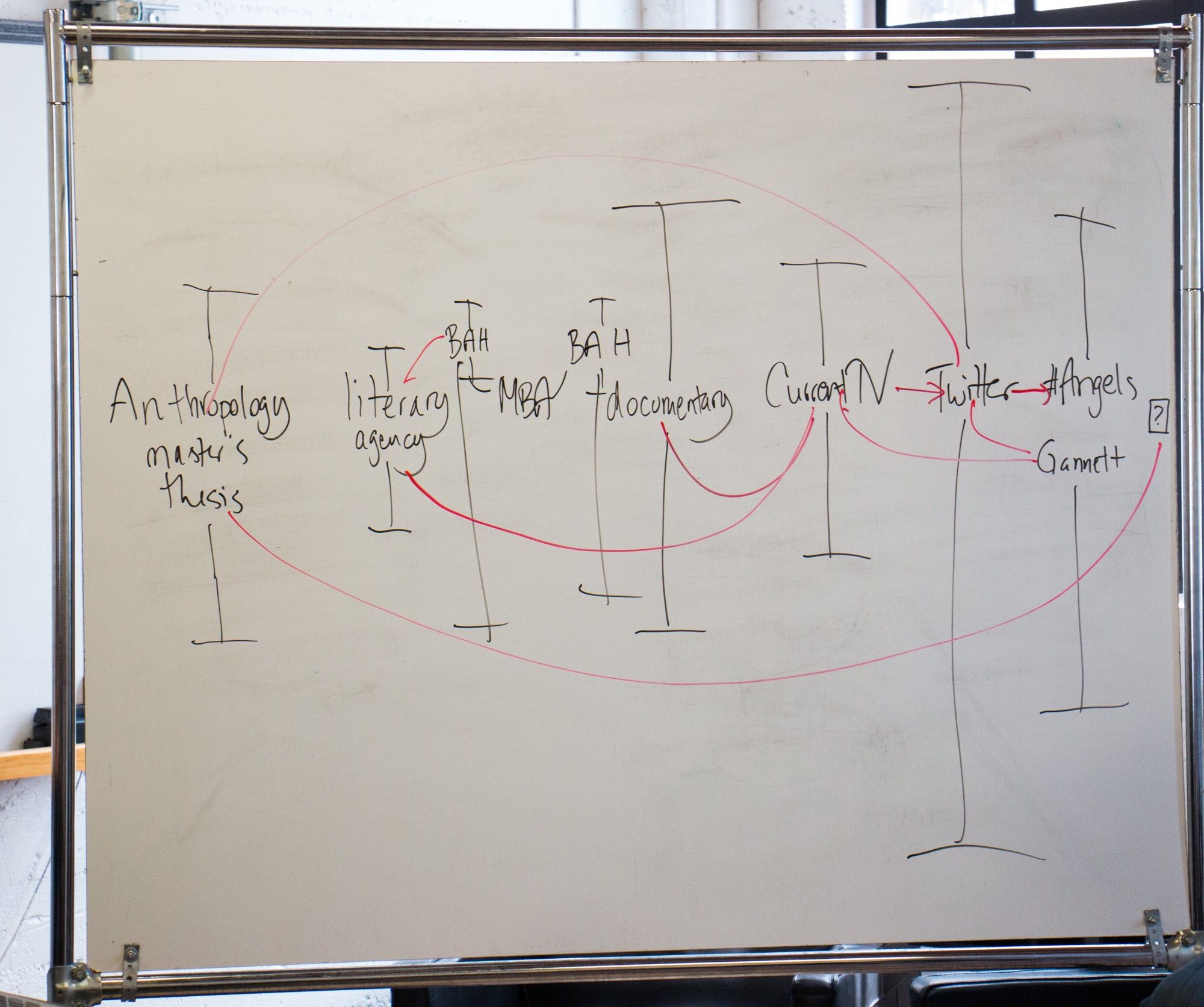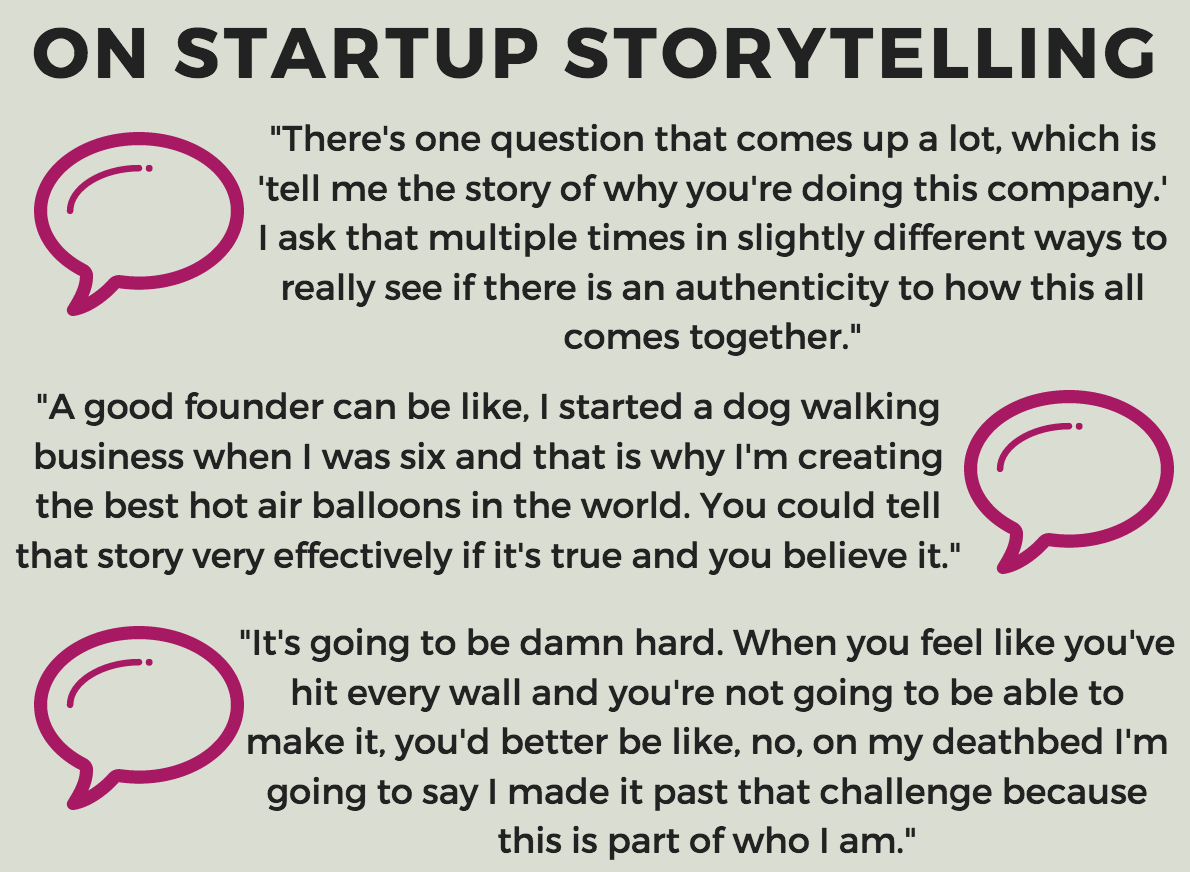“Relentlessness is my middle name.”

We take User-Generated Content for granted as part of TV news coverage today, but that trend had to start somewhere. Chloe Sladden had a major role to play in its genesis: at Current TV, she became the first person to integrate tweets into a live broadcast.
The breakthrough almost didn’t happen. Current’s 2008 U.S. presidential elections partnership with Facebook fell through with just three months to go. Sladden had already developed and pitched various other ideas that could bring voters’ personal perspectives direct to air in realtime but she still hadn’t been able to find one that the Current TV CEO, and Al Gore, former U.S. Vice President and co-founder of the channel, would sign off on. Her boss commended her efforts but said “let it go.” Instead, she and a handful of colleagues built a skunkworks, secretly experimenting with the then-fledgling microblogging platform, Twitter. After creating a prototype from its open API that won over the CEO and Gore, they established its first ever use case in live TV broadcasting.
Sladden recently shared the fascinating narrative of her career on the intersection of media and technology with an audience of our entrepreneurs in San Francisco as part of Matter’s The Drunken Walk* series.

“It was like the next MTV.”
When Chloe Sladden started working for San Francisco-based Current TV in 2005, it was the sexiest place to be in media at the time. All eyes were on the user-generated channel as it experimented with what TV could be in the digital era. Her job there was almost scuppered by a botched first interview with Gore in which he wasn’t satisfied with her repartee: “I completely flunked the interview with him. He asked me a question, I answered it and he asked the exact same question again.” Advocated for by a former colleague from the world of media consulting, she nonetheless took up the role of Vice President in strategic online partnerships, thus knitting together the worlds of media and technology, which has been a theme of her career.

She later transitioned to the TV side of Current, using a documentary film about dyslexia that she’d produced soup to nuts while working at Booz Allen as the proof she knew how to shoot, edit, distribute and market video content. “I began the new job nobody wanted, that I loved, which was to experiment with all the formats. We did mobile-shot content when mobile-shot video was such crap that we had to order Nokias from abroad to get high enough quality.”
In the run up to the 2008 presidential election, Sladden’s brief was to display content from 10,000 audience members on Current TV. 140 character tweets were the perfect conduit for their passion, but Twitter was barely on the map. To build a prototype to show her superiors the vast potential of the the microblogging platform, she went underground, recruited a bunch of her colleagues, and manually screened and pulled tweets into “Hack the Debate.” They burst to life on screen. Sladden realized the tiny team at Twitter had built a highly complementary technology for broadcasting networks the world over: “I could see at that moment that Twitter was a breakthrough because I was patient zero. I was a person inside traditional media trying to tell stories, trying to build an audience, and trying to get our audience to feel connected to our content.” Having won over Current, her next task was to convince Twitter that it had built an interactive platform that would “profoundly transform all media,” not just television.

“You just brought up the most foul topic you could.”
Sladden had long been an evangelist for the adoption of new technologies. She was exposed to cutting edge hardware as a child growing up in New York City, where her mother worked with children with learning disabilities, using technology to help level the playing field with their peers. At any given time, there were up to 10 brand new Apple Macs in her home. Her first job after studying History and then Anthropology at Stanford University, was as an assistant at a literary agency. She was fascinated by e-books and electronic ink but no one in the old world of paper and hardbacks wanted to discuss what she saw as an incredible opportunity: “Not only were they not interested they were actively like, this is disgusting.” She knew she couldn’t work in an industry riddled with a lack of desire to see things evolve.
Years later she would be, conversely, an executive at Current trying to convince Twitter not to write TV off as a remnant of the Stone Age: “At that time old media was considered non-innovative. Google didn’t give a crap about journalists. [Tech companies said] these industries are going to become extinct because they don’t know how to change and there’s no value there.”
“This is going to be the hardest thing you ever do.”
In 2009, the tables turned, and Sladden was eventually recruited by Twitter co-founder, Ev Williams, to join his team as Director (later VP) of Media. It was a big culture change: “I was very much an outsider. In my whole time at the company, I was the media person in a technology company whereas at Current I’d been the technology person in a media company.” She describes how, on the threshold of the bar where she was to meet Twitter co-founders Ev Williams and Biz Stone for drinks one evening just prior to starting, she had a premonition: “I became absolutely drenched in fear. It’s like every difficult thing I was going to experience the next six years all compressed into one second.” Nonetheless, she didn’t hesitate, and went on to embrace the toughest role of her career, staying 5 and a half years at Twitter.
A frenetic period of work ensued, as Sladden brokered partnerships with media companies, and assembled a team. Part of her philosophy was that her staff needed to be in their partners’ offices as much as possible, “living and breathing their world,” when they were broadcasting live events and integrating Twitter. Her training as an anthropologist came in handy as she read and understood media executives’ qualms about Twitter posing a threat to their business. She sought to show them that they were cultivating a symbiotic relationship, not a predatory one.
“We’re here to build our business with you. We’re not here to cannibalize your business. Twitter is only going to be successful if you’re successful. Twitter is a billion tweets that don’t have meaning if you’re not part of this process.”
She says that one of Twitter’s greatest assets has also been its undoing: an ongoing identity crisis that’s led to deep consumer confusion about its purpose and usefulness. “What was so powerful about it was that it could be thirty different great companies,” she says. “Ev was good at saying, let’s see what you can be. But at some point we needed to say this is what we will be, just this one thing.” For her, Twitter was a media company from the outset, but many of its executives, to whom media was an alien landscape, were reticent to see it that way. Twitter was and is at the mercy of hoards of “constituents,” some of the most vociferous voices on the internet, who all have an opinion on what it should be. “Everybody feels that they own Twitter, that’s what makes it a great brand. It’s an emotional bond which means you care a lot about the company,” she says.

“A startup of Chloe”
Sladden felt her own identity and values had become deeply intertwined with that of her employer, and when she left Twitter in 2014, she took some time out. She knew that if she jumped into the next opportunity, she’d probably stay in the media/technology groove, but she didn’t want more of the same. She asked herself, “what would it mean to pick my work in a context where I am my own startup?”
Before long, she had a product: #Angels, an all-female investment collective Sladden started with 5 other high ranking female Twitter employees, past and present. “I went to a birthday party of a Twitter colleague of mine,” says Sladden. “I had just had this amazing experience in a room of a new investors who were all women [at all-female investment group, Broadway Angels] and it was super cool. April Underwood, who is one of my friends and now the V.P. of Product at Slack, said, “We could do that.”
#Angels’s mission is to get more women on the cap tables of successful startups, demystify the investment process, and open up Silicon Valley’s “very tight-knit, homogeneous” networks to a more diverse range of angel investors. So far they’ve invested $1.5 million in a little over 30 companies. 30% of their portfolio has at least one female founder, and 25% has a female CEO. Sladden says her investment decisions have been divided between companies she thinks are great bets, and companies that are passion project — “I want this person to succeed or I want this product to exist” — such as a company reinventing the breast pump, and another making egg freezing affordable for more women.
Sladden is now mulling a new startup of her own, far away from the world of media innovation. She plans to build a product in the on-demand space, playing into the tech-facilitated transformation of the labor force that’s currently underway: “Work is changing fundamentally, going from having one or two jobs with a set wage and a boss and being associated with a brand to multiple jobs, seasonally different, where it’s hard to figure out what your actual net wage is because of surge pricing.” And she’s looking for a mission and values-driven co-founder to join her.
She hasn’t completely turned her back on her former world, though. As well as mentoring a number of digital media startups, she’s brought her expertise to the board of Gannett, a news old-timer that owns more than 100 media properties, including USA Today. Perhaps surprisingly, the experience has been a breath of fresh air. “I was so used to walking into rooms to evangelize the shit out of things and help people see things they couldn’t see,” she says. But she joined a board that was in transition, where two thirds of the seats were newly allotted, and a company that was in the process of splitting. It means that she’s had the opportunity not to reinforce or oppose a culture, but to shape one. “Everything is up for grabs,” she says. And that feels like a startup in its own right.
The Drunken Walk is a series of live fireside chats, blog posts, and podcasts (coming soon!) from Matter Ventures, the world’s only independent startup accelerator for media entrepreneurs. We dive into the personal stories of founders, experts, and innovators in media to uncover the moments in their careers that changed everything. Our goal is to inspire and empower the next generation of media entrepreneurs to get from A to B without a map.

